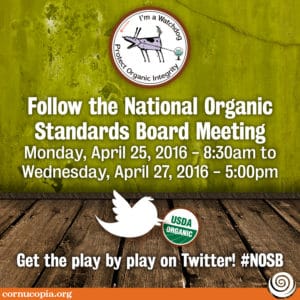 Last Updated: 4-27-16, 5:00 p.m. ET
Last Updated: 4-27-16, 5:00 p.m. ET
Join The Cornucopia Institute as we live tweet from the National Organic Standards Board meeting in Washington, D.C. We will be sharing the play by play with our Twitter followers under #NOSB or simply follow our stream.
If you’re not already following us on Twitter, please do so here.
Read The Cornucopia Institute’s written comments to the NOSB here.
You can also stay updated throughout the meeting right here:
Wednesday, April 27, 2016
The NOSB meeting has adjourned.
3:59 p.m. ET: The Crops Subcommittee presented a discussion document to consider an annotation change for EPA List 4 Inerts to prohibit substances from the group known as nonylphenol ethoxylates (NPEs). This annotation change would be presented as an additional recommendation prior to the implementation of the October 2015 NOSB recommendation for a new annotation for inerts that references FIFRA 25(b) inerts list and EPA’s Safer Chemical Ingredients Lists.
Cornucopia supports the prohibition of NPEs, but wants the NOSB to continue to review inerts individually under OFPA criteria. You can read more in Cornucopia’s written comments here.
3:43 p.m. ET: The petition for soy wax – as production aids for use in log grown mushroom production, was sent back by the NOSB to Crops subcommittee. This was based on whether or not the annotation “must be made from non-GMO soybeans” should be an annotation on the listing, given the fact the GMOs are already an excluded method.
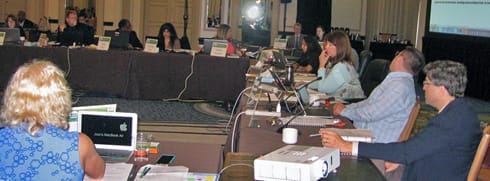 |
2:56 p.m. ET: “Squid Byproducts” for use as a fertilizer was added to the National List with the annotation (restriction), “Can be pH adjusted with Sulfuric, Citric, or Phosphoric acid. The amount of acid used shall not exceed the minimum needed to lower the pH to 3.5.”
The petition from Shoreside Organics, LLC originally was for “Squid and Squid Byproducts,” but the words “Squid and” were removed from the listing to ensure that only the byproducts are used. Four members voted against the petition for listing based on concerns of encouraging the harvest of squid just for fertilizer use.
Cornucopia supported the listing of “Squid byproducts.”
2:29 p.m. ET: EnergyWorks BioPower, LLC submitted a petition to revise the prohibition listing of ash from manure burning. They want the revision to include the following annotation: “except where the combustion reaction does not involve the use of synthetic additives and is controlled to separate and preserve nutrients.”
The petition to amend this prohibition was voted down 15 to 0. Cornucopia submitted comments that burning manure, much of which comes from CAFOs, is not an appropriate method for recycling organic wastes under OFPA.
2:15 p.m. ET: The NOSB’s Crops subcommittee discussed the 2018 Sunset materials copper sulfate, ozone gas, peracetic acid, EPA list 3 inerts and calcium chloride. The subcommittee seeks additional comments from the board and public to address the specific questions that they are asking now. This information will be useful for the fall 2016 vote on the materials.
12:37 p.m. ET: The NOSB has passed the Ancillary substances proposal. These are additives intentionally added to a nonorganic substance already on the National List that are not removed, but are not expected to be found in the final organic product. Cornucopia commented that these materials should only be allowed for use if reviewed individually under Organic Foods Production Act.
To read more of Cornucopia’s position, click here.
12:34 p.m. ET: The NOSB discussed Sodium dodecylbenzene sulfonate (SDBS), a material petitioned by Ecolab, Inc. for use as an antimicrobial/sanitizer (used along with Lactic acid) in treating fruits and vegetables at organic food retail establishments. The board voted to send this back to the subcommittee for further review.
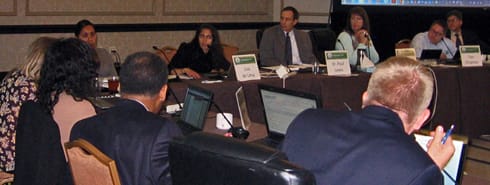 |
Cornucopia commented that peracetic acid and hypochlorous acid may be better alternatives, but that a technical review evaluating all sanitizers and their specific uses is needed before more sanitizers are added to the National List.
Five NOSB members did not want it returned to subcommittee. They were likely to vote against adding the material to the National List, based on their discussion points. NOSB member Francis Thicke (environmentalist) pointed out that he is concerned that there is a benzene ring in the chemical structure of SDBS. Emily Oakley (farmer) commented that Organic Produce Wholesalers Coalition did not support its listing.
11:34 a.m. ET: The NOSB has rejected a petition to add oat beta glucan to the National List. The material failed as it was not deemed essential. Oat beta glucan was petitioned by manufacturer Tate & Lyle as a natural component of oats to supplement processed food by increasing fiber content.
11:32 a.m. ET: The NOSB has voted to add sodium and potassium lactates to the National List, for use as antimicrobial agents.
The National Organic Program had previously reported that a current petition to add the materials would not be necessary since the materials sodium and potassium lactate were composed of substances that were already included on the National List (sodium hydroxide, lactic acid, and/or potassium hydroxide). This interpretation caused some confusion within the organic industry as well as with possible use of other lactate salts (example: calcium lactate), so a petition for use of the materials was submitted.
Cornucopia submitted written comments that these are unnecessary preservatives. Nearly all NOSB members voted in favor of adding to the National List except Francis Thicke (environmentalist and organic dairy farmer) who voted no based on his concern that it is used as a preservative. Two NOSB members abstained, Harriet Behar (environmentalist) and Emily Oakley (farmer).
9:57 a.m. ET: The NOSB’s Handling Subcommittee is now reviewing materials scheduled for their 2018 Sunset. There will be no vote on these substances until the fall: Agar-agar, Animal enzymes, Calcium sulfate-mined, Carrageenan, Glucono delta-lactone, Cellulose, Potassium hydroxide, Silicon dioxide, Colors: Beta-carotene extract.
For Animal enzymes, NOSB member Harriet Behar (environmentalist) pointed out that Europe is grappling with this issue currently and it could be another revenue stream for farmers by obtaining enzymes from organic animals.
For carrageenan, the subcommittee is currently undecided and it was noted that the unprecedented short time between when the comments were due and the meeting made it hard to absorb all the comments. Debate continued over the science, environmental effects of farming red seaweed, and the thousands of purported jobs created from producing carrageenan.
Cornucopia’s written analysis of all these materials can be viewed here.
8:56 a.m. ET: The final day of the NOSB meeting in Washington, D.C. has begun. The Compliance, Accreditation, & Certification Subcommittee is adding “Eliminating the Incentive to Convert Natural Ecosystems into Organic Production” to their work agenda. Currently there is actually an incentive to convert wildlands to organic production rather than already tilled farmland from conventional production because there is no three-year transition required for wildlands that have never had chemicals used on them.
Tuesday, April 26, 2016
6:34 p.m. ET: The vote on new revisions to the 2012 version of the PPM passed 11 Yes, 2 No, 2 Abstain (the policy and procedures manual is designed to assist the NOSB in its responsibilities and how it operates). Francis Thicke, environmentalist member and new farmer member Emily Oakley were the only No votes.
Cornucopia commented that the changes made to the PPM represent a dramatic shift in policy for the NOSB. Chief among the changes that the draft proposal adopts is the increased role of the NOP in NOSB administration. As dictated by federal law, the duties of the NOSB should remain theirs alone.
5:25 p.m. ET: The proposal for the following annotation changes for emergency parasiticide use passed unanimously with an intention to remove Ivermectin in the fall:
That parasiticides continue to be prohibited in slaughter stock.
That the milk withholding period after treatment with Fenbenzadole or Moxidectin be changed from 90 days to 2 days for dairy cows, and 36 days for goats and sheep.
That the listing for Ivermectin remains as presently listed, with a 90-day withdrawal period.
That Moxidectin be allowed for both internal and external use.
That fleece and wool from fiber bearing animals be allowed to be certified organic, even if use of parasiticides was necessary at some time in the animal’s life.
That Fenbenzadole be allowed without written order of a veterinarian.
Note: the routine use (preventative use) of parasiticides is prevented in organics.
Cornucopia supported the intention to remove Ivermectin from organics.
5:08 p.m. ET: The proposal to amend the withdrawal period from 90 days to 8 days after administering lidocaine and procaine to livestock passed unanimously. There is strong support from the American Society for the prevention of cruelty to animals and the Humane Society to encourage these anesthetics to be used to improve animal welfare. There are no suitable alternatives to lidocaine which is also used on humans. The withdrawal time is double the time required in conventional livestock.
Cornucopia supported this change that was brought to the board by its Livestock subcommittee.
5:05 p.m. ET: The petition to add Hypochlorous acid to the National List passes unanimously. Made by a machine that makes electrolyzed water, Hypochlorous acid is proposed to be as effective as bleach as a sterilizer with 10,000 times less chlorine. It is expected to be similarly approved by two other committees, the crops and handling subcommittees.
Cornucopia supports the removal of all chlorine products from organics, but was neutral on adding this synthetic to the list. Cornucopia had instead requested that the NOSB commission a Technical Review that (1) determines what disinfectant/sanitizer uses are required by law, and (2) comprehensively reviews more organically compatible methods and materials to determine whether chlorine-based materials, including Hypochlorous acid are actually needed for any specific purposes.
4:41 p.m. ET: As the NOSB turns to the work of its subcommittees, the Materials subcommittee takes up discussion of the excluded methods document. The document is sent back to the subcommittee for further review with the understanding that it contains inaccurate definitions. The subcommittee hopes for a vote on the updated document at the November meeting of the NOSB.
3:42 p.m. ET: Closing remarks from the Biotech panel:
Dr. Gould: “I would like to work internationally on this and share the burden of addressing the complexity of this outside the program.”
Dr. Hansen: “USDA should open this process and get as many views as you can and I’m happy to help in the future.”
Dr. Tracy: “I will continue to help you with this document.”
Dr. Scorza: “Breeders in general are trying to help improve agriculture. The ability to discuss your needs with those doing the techniques, but understanding each other, is helpful.”
3:20 p.m. ET: Dr. Hansen observes, “There needs to be a lot more respect for the complexity of natural systems and organic has been very good at this. What seems like a quick cure might have unintended consequences. Utility patents keep other scientists from understanding what else has been changed. Human hubris has already come back to haunt us.”
3:00 p.m. ET: Biotech panel member Dr. William Tracy of the University of Wisconsin-Madison: “This is not just about the science, this is about ethics and values and process. Organic incorporates the principles of health, ecology, diversity, care, transparency, access and sharing. Let’s talk about what Organic is and not what it isn’t. Let’s talk about the process not the end product. CRISPR does require the GM technology, but it will not have a GM product in it. I strongly support that utility patenting should be prohibited.”
2:43 p.m. ET: Biotech panel member Michael Hansen of Consumers Union says the NOSB should use the Codex Alimentarius which has global definitions of modern biotechnology and is the intergovernmental standard that is used internationally to identify techniques used to derive foods with biotechnology. These definitions should be used for excluded methods in organics because even with more precise techniques like CRISPR, we can’t understand off-target effects. Marker assisted selection should be allowed.
2:26 p.m. ET: As the biotech panel discussion continues, Ralph Scorza, USDA ARS researcher, describes fast track breeding:
Using traditional breeding, it takes 15-20 years to produce a variety and even longer when introducing a trait from a wild ancestor, like disease resistance. Using fast track breeding, a genetic engineering technique, we can shorten the time significantly. We have rapidly emerging diseases like citrus canker, citrus greening, chestnut blight, plum pox virus, dutch elm disease, hemlock woolly adelgid, oriental fruit fly, brown marmorated stink bug. Is it safe? We believe it has to go through the regulatory process and assess the safety of the genes that are being introduced.
2:19 p.m. ET: Following the close of public testimony, the NOSB hears from a panel on emerging techniques in Agricultural Biotechnology. Says Dr. David Gould of IFOAM, “Nothing is more complicated than this issue, and we are entering a phase that we have never seen before as far as accessibility and cheapness to genetic modifications. We have to get out in front of it. Who is going to detect this? It can’t be the organic sector that pays for it. This is a broader regulatory issue for the common good beyond the organic program.”
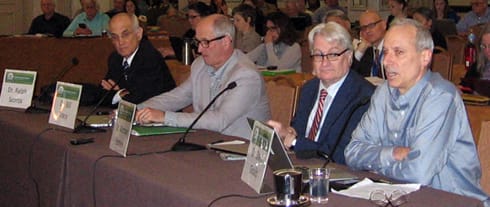 |
2:10 p.m. ET: The Organic Trade Association’s Laura Batcha spoke to the NOSB. She attempted to debunk Cornucopia’s concerns about conflicts of interest. OTA represented, when the Organic Center was a contractor doing technical reviews for the NOSB, that it was prior to the OTA’s “legal administration” of the nonprofit.
[In actuality the Organic Center was founded by OTA leadership and its board chair, for many years, was Mark Retzloff (founder of Aurora Dairy). Retzloff continued in that role at the Organic Center even after USDA investigators found Aurora in “willful” violation of the organic standards. Cornucopia’s Mark Kastel refers to the OTA’s testimony as Corporate spin.]
2:07 p.m. ET: Bill Wolf, longtime organic insider, tells the NOSB: “Don’t make shrinking the list a goal – this list is not a popularity contest over comments for or against. This standard is tighter today than two, five, and 10 years ago.”
1:47 p.m. ET: Public testimony continues after lunch. Nina Mahmoudpour, Cornucopia member and Georgetown law student, said:
Making N.O.S.B. applications public would allow the community to help the Secretary pick the best and brightest. And it might have prevented the kind of lawsuit that is pending right now challenging legally unqualified board members.
Through the Freedom of Information Act, The Cornucopia Institute has had to sue the USDA to secure the identities of the “scientists” writing the Technical Reviews. Another Cornucopia lawsuit is now resulting in the release of enforcement data. Why are lawsuits necessary? This information belongs to the public. According to the Federal Advisory Committee Act, all N.O.S.B. deliberative documents should be available.
12:14 p.m. ET: Lynn Coody of Organic Produce Wholesalers Coalition is the only written support of the PPM revisions. She says they appreciate the effort, that there needs to be a clear written procedure under which we all operate under.
Click here to see Cornucopia’s concerns about the Policy and Procedures Manual changes.
12:01 p.m. ET: Beth Unger of CROPP/Organic Valley: Cellulose is used in peel-able cellulose casings in our hot dogs and powdered as an anticaking agent for our shredded cheeses. CROPP also supports potassium hydroxide and nutrients, vitamins and minerals. As of this April, they have completely removed carrageenan from all their product lines, including ultra-pasteurized heavy whipping cream.
11:35 a.m. ET: A representative from One Straw Farm: Please stand by the original approval of biodegradable mulch. One Straw Farm withdrew their application for organic status because they wanted to use biodegradable mulch to get cover crops in the ground quicker in the fall (rather than having to remove the plastic mulch they simply till in biodegradable mulch). NOSB member Zea Sonnabend asked about the components of the breakdown products. Their response was that it breaks down quickly and other parts of the world allow approval.
11:28 a.m. ET: Marni Karlin, speaking for the Organic Trade Association, tells the NOSB to take the excluded methods proposal back to subcommittee and fix definitions before the fall vote. Codex definitions should be used instead of Cartagena Protocol. Secure a definition of non-GMO as a process-based definition that is enforceable.
11:21 a.m. ET: Albert Straus and Bob McGee of Straus Family Creamery: We support the excluded methods document – it may not be perfect but move it forward and continue to work on it. We do not use carrageenan in any of our products. In the past we used it in one product, and then removed it and didn’t notice that the product suffered.
He says they have data on the number of cows that can be supported on pasture. A healthy animal comes from good production practices and does not need parasiticides. He’s concerned with grassfed as being a replacement for Organic – we need to have better standards. It comes down to management practices.
11:11 a.m. ET: Brit Lundgren of Stonyfield: “We support adding vitamin D to yogurt even though it isn’t required by law. Vitamin D meets consumers’ expectations for what yogurt contains. Stonyfield has just finished getting carrageenan out of all their products.”
11:08 a.m. ET: Annie Rouse, a Fulbright scholarship hemp researcher: “US organic hemp should be approved. Prohibiting it in organics, as it currently is, is against the law.”
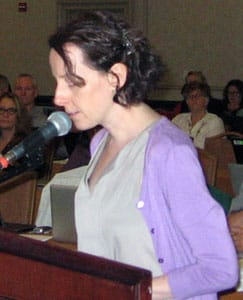 |
NOP’s McEvoy says further guidance is close to being published. “Industrial hemp is a different variety of Cannabis sativa and has less than 1% THC compared to 25% THC content of marijuana, and it is a fiber and oil crop. The low amount of THC is in the flowers not the rest of the plant.”
10:29 a.m. ET: Suzanne McMillan of ASPCA: “Pain control is crucial to animal welfare. We support the proposal to reduce the withholding period for procaine and lidocaine. We encourage the use of proper space in organic systems to avoid the removal of beaks and tails.”
10:24 a.m. ET: Marty Mesh of Florida Organic Growers: “Citrus greening is ruining the Florida citrus industry, not just organic. We need to look at solutions for them now.”
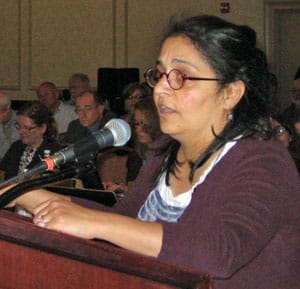 |
10:08 a.m. ET: Urvashi Rangan of Consumer Reports: “The natural label undermines the organic label.” Regarding carrageenan, she says that organics has a bigger task than conventional food. “You are required to know that carrageenan is safe and not rely on GRAS, which FDA admits there are flaws.”
9:47 a.m. ET: A representative for Ingredient Solutions: “There’s no conspiracy between government agencies and carrageenan manufacturers.” Cornucopia is simply pointing out that public research showing harm exists and is stating that all the research showing its safety comes from the industry.
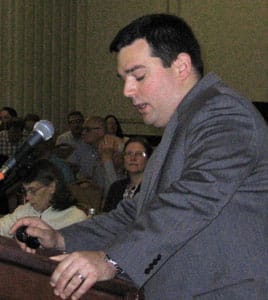 |
Marinalg, the trade-lobby group representing carrageenan manufacturers, says “Carrageenan does not contain poligeenan.” In fact, Cornucopia released documents from The Marinalg Working Group that shows otherwise.
9:30 a.m. ET: Garth Call to the NOSB: “Please keep ivermectin and the whole slew of de-wormers on the list to prevent resistance build-up in the worm.”
9:20 a.m. ET: Peter Barbara from the fishing industry: “Squid is not harvested just for fertilizer because fishermen don’t make enough money to do so, but sometimes the product goes bad so whole squid end up in byproduct for fertilizer. The fishing industry is highly regulated.”
9:19 a.m. ET: John Ashby tells the NOSB: “Silicon dioxide, yes. Sanitizers, more. OMRI is not evil.” Let’s not do Monsanto’s work by removing necessary tools.
9:09 a.m. ET: Eugene Ung of Best Gel Products tells the NOSB about softgel formulation, “carrageenan is a necessary stabilizer in powder formulations for the range of sizes of vegetarian soft gel formulation.” Currently there are no organic soft gels.
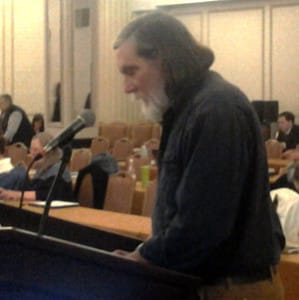 |
9:00 a.m. ET: The NOSB meeting has resumed with more public testimony. Jim Gerritsen, “veteran Maine organic farmer,” reads a letter signed by the Agrarian Elders in support of Cornucopia and asking the NOSB to fight corporate interests.
Monday, April 25, 2016
6:22 p.m. ET: Hydroponic operator Colin Archipley tells the NOSB: Veterans are being trained in a more sustainable way of growing and running small businesses involving hydroponics. Let’s be inclusive, not exclusive.
6:21 p.m. ET: Grocery Manufacturers Association representative Manaju Basu: “We recognize that some people are allergic to peanuts like some people are allergic to carrageenan.”
Cornucopia contends that carrageenan is not a food, but rather an unessential food additive and that research shows harm in all individuals.
6:19 p.m. ET: Jim Crawford a Cornucopia Policy Advisor and farmer “I am here today to respectfully encourage you, members of the NOSB, to listen to the seasoned experts on Cornucopia’s staff, who have the best interests of all of us farmers at heart, and who only hope to protect the integrity of organic agriculture.”
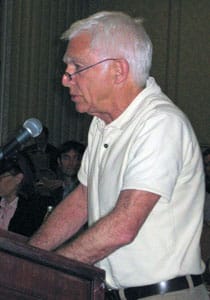 |
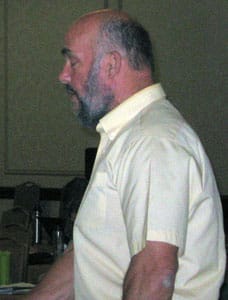 |
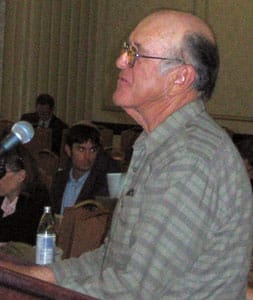 |
Mark Stanley, a Cornucopia farmer member “A great many of us organic farmers believe in the work and in the views of The Cornucopia Institute. Many of us farmers have supported Cornucopia for many years. We think they have enormous integrity and expertise.”
Roy Brubaker a Pennsylvania farmer, Cornucopia member: “The quality of a product is directly dependent on the integrity of the producer.”
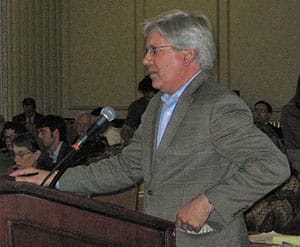 |
5:58 p.m. ET: Jay Feldman, former NOSB member and representing Beyond Pesticides: “We are not supporting farmers when we take away processes that ensure the integrity of the organic label. When we do this we will see other labels filling the gap. The NOSB has historically established a tone of openness which must be continued. To the NOSB: when it comes to working with the NOP, do not confuse collaboration with concurrence.”
5:48 p.m. ET: Two Hain Celestial employees speak in support of nutrients, vitamins and minerals, and silicon dioxide to keep organic products competitive in the marketplace. Cornucopia’s written comments assessing these and other issues being brought before the NOSB can be found here.
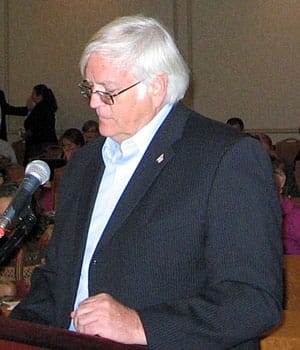 |
5:42 p.m. ET: Richard Matthews of the Western Organic Dairy Producers Alliance, and former NOP director, expresses support for hypochlorous acid produced through electrolyzed water because it uses only water and salt, rather than other methods which use other chemicals which the NOSB has not reviewed. In terms of hydroponics, he also warns that we need to be careful not to take away germinating seeds for fodder for organic livestock.
5:34 p.m. ET: Alison Cook of International Food Additives Council states support for carrageenan as a food stabilizer and silicon dioxide as a defoamer, and cellulose as an anti-caking agent and filtering aid because no known source of organic cellulose is known.
NOSB member Tom Chapman (handler/Clif Bar) points out that other than liquid infant organic formula, there are no other organic products that are only available with carrageenan.
5:18 p.m. ET: Gwendolyn Wyard of the Organic Trade Association: Current sales of fortified organic products speak to consumer preferences to have them in there, despite non-profit consumer groups that are stating otherwise.
5:14 p.m. ET: Robert Rankin of Infant Nutrition Council of America states that nutrients, vitamins, and minerals and carrageenan are important to ensure proper nutrition for liquid organic infant formula. Carrageenan is a unique substance and it is the only stabilizer with these qualities. Cornucopia scientists contend that it is these unique characteristics that make it bioactive in the colon as well.
4:35 p.m. ET: Henry Dow from HSP USA, LLC, a producer of electrolyzed water equipment, supports Hypochlorous Acid without any limitation concerning its use as a material on the National List. It’s part of chlorine materials use in crops, handling and livestock.
4:28 p.m. ET: Patrick Kerrigan, speaking for the Organic Consumers Association, tells the NOSB that “Carrageenan has become the poster child for unnecessary synthetics in organics and the erosion of organic integrity.”
4:27 p.m. ET: Terry Shistar, speaking on behalf of Beyond Pesticides, says that “List 3 inerts should sunset and individual inerts should be thoroughly reviewed under OFPA criteria and individually listed. Nutrients vitamins and minerals should only be used if required by law. Sunset reorganization: just do it!”
4:03 p.m. ET: Patty Lovera, of Food and Water Watch, prefers the Codex definitions of excluded methods in organics. She states that nutrients, vitamins, and minerals, ancillary substances, and inerts should be individually listed and evaluated against OFPA criteria”
3:38 p.m. ET: Kip Rondy, organic farmer-owner of Green Edge Organic Gardens in Ohio, poses this question to the NOSB: “What good are standards if we don’t have the courage to enforce them?”
3:34 p.m. ET: Liana Hoodes of NOFA NY, former executive director of NOC, testified that she hopes that the genetically engineered diamond back moths should not be allowed to be released in organic fields for biocontrol of the insect pests.
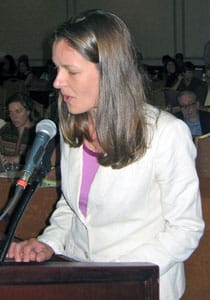 |
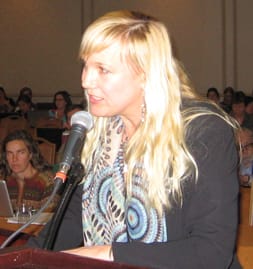 |
3:32 p.m. ET: Charlotte Vallaeys of Consumer Reports: “Data from Consumer Reports shows that 70% of consumers do not think that non-organic ingredients should be used in organic food. Carrageenan is non essential.”
3:23 p.m. ET: Margaret Barnes of Moms Across America encourages the NOSB to help keep organic food safe.
3:23 p.m. ET: United for Food Science director and the Natural Products Association assures the NOSB that carrageenan is safe.
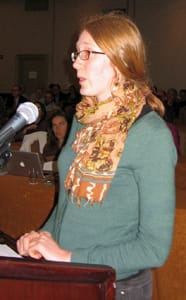 |
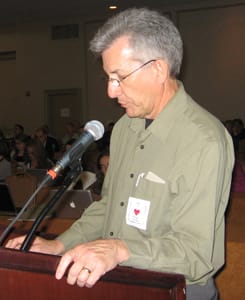 |
NOSB member Zea Sonnabend asks whether United for Food Science gets money from carrageenan manufacturers, and the answer is “yes.”
3:08 p.m. ET: Holli Cederholm of OSGATA (Organic Seed Growers and Trade Association): “The PPM should be tabled, organic should be soil based, GE contamination of organic seeds should not be tolerated, and organic seed breeding should have four principles: Respect plant integrity, Support genetic diversity, Remain farm centered, and Honor the public domain.” OSGATA’s website has more details on these basic principles of plant breeding.
2:59 p.m. ET: Sam Welsch of OneCert, one of the most respected certifiers in the country: “two issues that damage the integrity of the Organic Industry: allowing hydroponics and the sunset change.”
2:58 p.m. ET: The representative of International Dairy Foods Association states that they endorse many 2018 handling sunset materials including agar-agar, carrageenan, and cellulose for their continued use in Organic Dairy based on their unique characteristics.
2:46 p.m. ET: Linley Dixon, senior scientist at Cornucopia: “To date, there are 1,300 individuals that have reported medical details through our website regarding better health after removing carrageenan from their diet. If there were an open docket between now and the fall vote, you would hear many stories like those for yourself.”
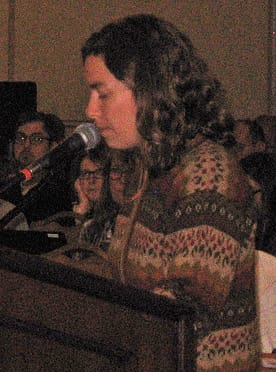 |
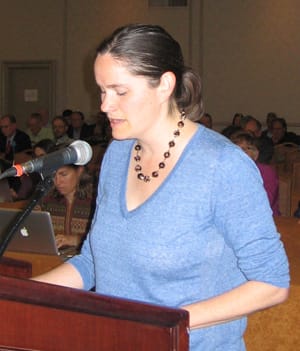 |
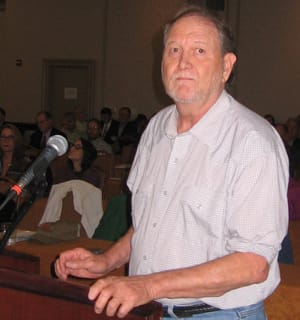 |
2:41 p.m. ET: Abby Youngblood, the executive director of NOC, talks about the important role of the NOSB. She expresses concerns that the changes in the PPM weaken this role as representatives of all organic stakeholders.
2:38 p.m. ET: “Don’t choke the delicate balance we have created,” says former NOSB member Michael Sligh while suggesting that the changes to the PPM be tabled.
2:17 p.m. ET: Cameron Harsh from the Center for Food Safety (CFS), testifies that the truncated time between online posted NOSB meeting materials and the actual meeting shortened the time needed to review all comments. CFS also has many specific issues with the changes made to the PPM. They were submitted in writing to the board.
2:13 p.m. ET: Public testimony resumes at the NOSB meeting. Jim Gerritsen, a Maine organic potato farmer, speaks on behalf of Agrarian Elders in support of Cornucopia and their opposition to the certification of hydroponic operations and Sunset and other Policy and Procedures Manual changes. A letter signed by the Agrarian Elders was handed out to the NOSB.
12:59 p.m. ET: “The NOSB guidance does not go far enough to ensure the use of organic seed and should reference the organic seed finder as a resource,” testifies Melody Meyer, of grocery distributor United Natural Foods. “The excluded methods chart needs more work and should go back to experts for review. The NOSB should use CODEX definitions of biotechnology. Biodegradable mulch should be allowed for use.”
12:48 p.m. ET: Christin Badger testifies for the National Organic Coalition. She says, “For sanitizers one of the biggest questions that keeps coming up is ‘Is that the best material for this purpose?’ We need a new technical review of all sanitizers to answer these questions.”
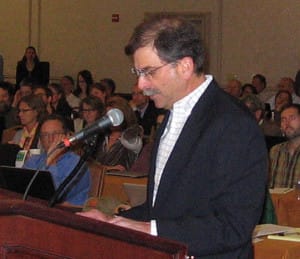 |
12:36 p.m. ET: Mark Kastel, Cornucopia’s Codirector, testifies before the NOSB. He tells the board that “No issue is more important than tabling the power grab by the USDA, in the form of the rewritten Policy and Procedure Manual. Please vote to retain NOSB control over the future of this industry.”
Read Kastel’s full (corrected) testimony here.
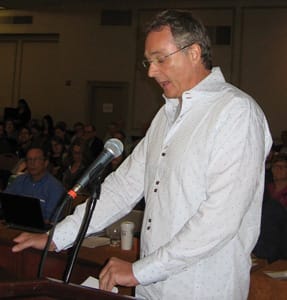 |
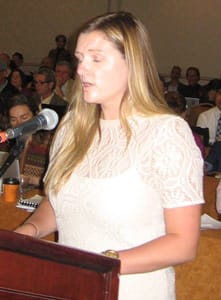 |
12:29 p.m. ET: Tom Beddard, owner of Lady Moon Farm, and his 29 year old daughter who is the same age as their farm testify against hydroponics and present a petition with 1,300 signatures for a moratorium on all new hydroponic operations.
Most consumers don’t know and are shocked when they hear that organic peppers and tomatoes are grown hydroponically and wouldn’t pay the organic premium for produce with the highly coveted organic label if they knew. Hydroponic operations from countries that ban organic hydroponics in their own countries are exporting to the US.
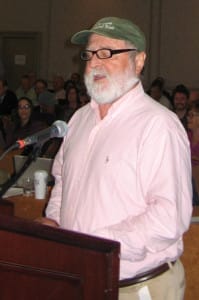 |
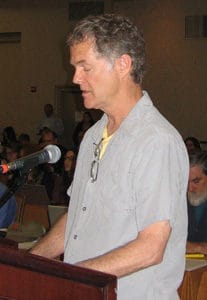 |
12:20 p.m. ET: Excerpt of testimony by Dave Miskell, organic farmer:
“A few years ago, as farmers we discovered that lots of Organic certified tomatoes were coming from Mexico and we have learned that these are hydroponic tomatoes, despite the 2010 NOSB recommendation [the NOSB recommended against certifying hydroponics as organic in 2010 which was ignored by the USDA] and I started to be concerned about Organic integrity. We need a moratorium on certified hydroponic operations before this becomes too big to fail.”
12:14 p.m. ET: Public comments begin at the NOSB meeting.
Farmer Dave Chapman says that the hydroponics decision is a defining moment in “Organic Integrity.” What happens when organic means one thing to the NOP and a different thing to the Organic farmers and community?
11:41 a.m. ET: John Biernbaum, of the Hydroponics Task Force, is concerned that hydroponics takes systems that are very large and reduce it. For example, how do the 6-7 billion organisms in soil translate into a hydroponic system? We don’t know.
11:34 a.m. ET: The NOSB in 2010 recommended that hydroponic systems be prohibited because it required unapproved inputs, insufficient carbon and biology in systems, and no nutrient cycling.
The task force is suggesting that “bioponics” container systems, for example, based in coconut husk, can operate within the National List and has biology in the system and nutrient cycling.
Cornucopia contends that the USDA’s National List is for limited use “exceptions,” not for the allowance of an entire system that requires these inputs.
11:30 a.m. ET: The panel set up by the NOP to assess hydroponics is now making a presentation.
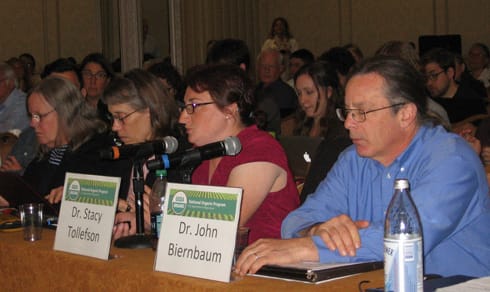
10:54 a.m. ET: Only four entities can be contracted to conduct technical reviews for the National Organic Standards Board.
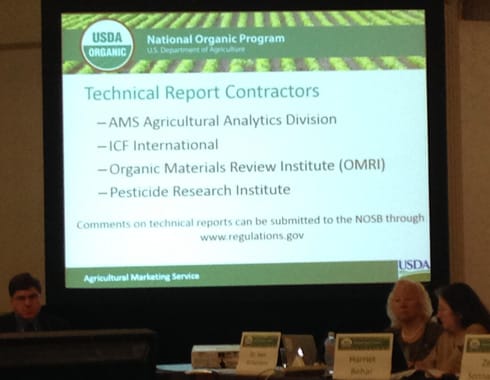
NOP has been making the identities of the scientists conducting the technical reviews secret after Cornucopia revealed conflicts of interest. Cornucopia is now using Freedom of Information Act (FOIA) requests to reveal who the scientists are.
10:37 a.m. ET: NOSB member Francis Thicke (environmentalist and organic dairy farmer) asks McEvoy about a comment period extension on the new draft animal welfare rules, expressing concerns for winter housing for livestock. McEvoy says, “We’re looking into it.”
10:34 a.m. ET: Two very different views of organic poultry.
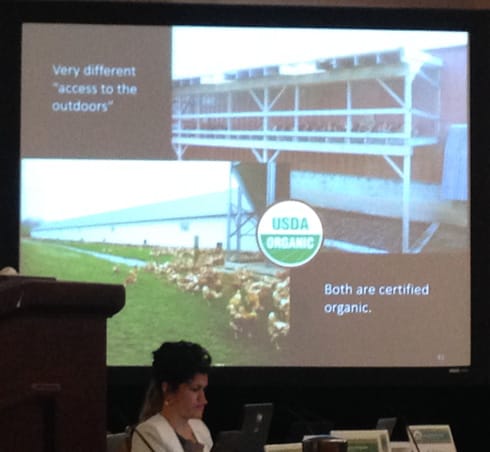
NOP’s McEvoy continues his opening remarks with this comparison of what’s currently being certified. Earlier this month the NOP released a new draft rule to address this issue and others in animal welfare. Porches for poultry have been criticized by Cornucopia and others as not organic.
10:28 a.m. ET: Members of the public attending the NOSB meeting:

10:17 a.m. ET: Report from Hydroponic task force should be available this summer.
Results from 2016 survey to certifiers: 17 certifiers reported certifying hydroponics and aquaponic operations, 30 certified hydroponic operations, 22 certified aquaponic operations, 69 certified container based operations.
10:16 a.m. ET: A growing controversy at the NOP is the use of soil-less systems for organic agriculture (hydroponics and aquaponics). This image reveals the growth since 2010 of such systems.
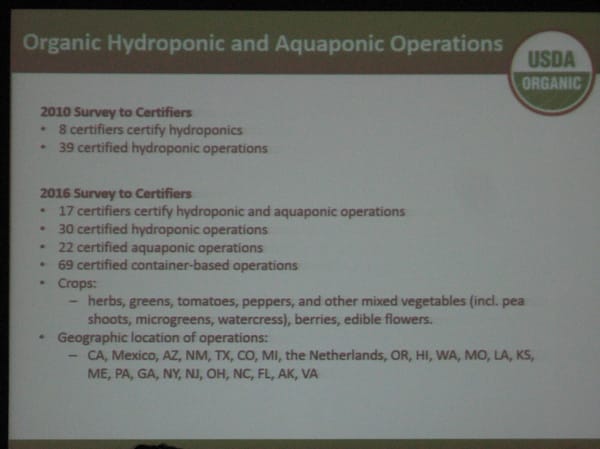
10:13 a.m. ET: USDA National Organic Program Director Miles McEvoy tells the NOSB that they have begun online posting of enforcement actions. For years Cornucopia has criticized the USDA for the secrecy surrounding enforcement actions, arguing that posting the information acts as a deterrent and helps prevent organic fraud.
9:51 a.m. ET: New NOSB members:
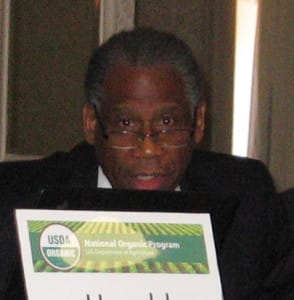 |
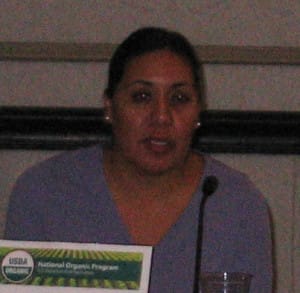 |
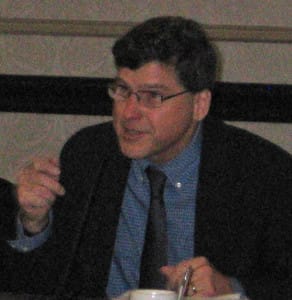 |
| Jesse Buie (farmer) | A-dae Briones (consumer/public interest) |
Dan Seitz (consumer/public interest) |
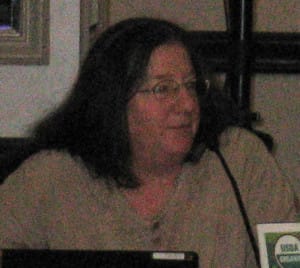 |
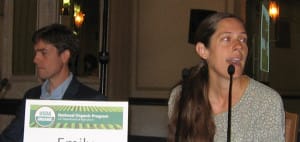 |
| Harriet Behar (env./conservationist) |
Scott Rice (cerifier) and Emily Oakley (farmer) |
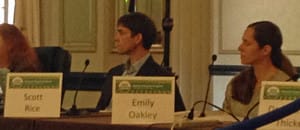 9:38 a.m. ET: Two of the new NOSB members, Emily Oakley (farmer) and Scott Rice (certifier):
9:38 a.m. ET: Two of the new NOSB members, Emily Oakley (farmer) and Scott Rice (certifier):
9:30 a.m. ET: NOSB members introduce themselves:
New farmer members Jesse Buie from Mississippi and Emily Oakley from Oklahoma; consumer members A-dae Briones from New Mexico and Dan Seitz from Birkshire, Massaachusetts; Harriet Behar, conservationist seat from Wisconsin, and Scott Rice certifier member from Washington state.
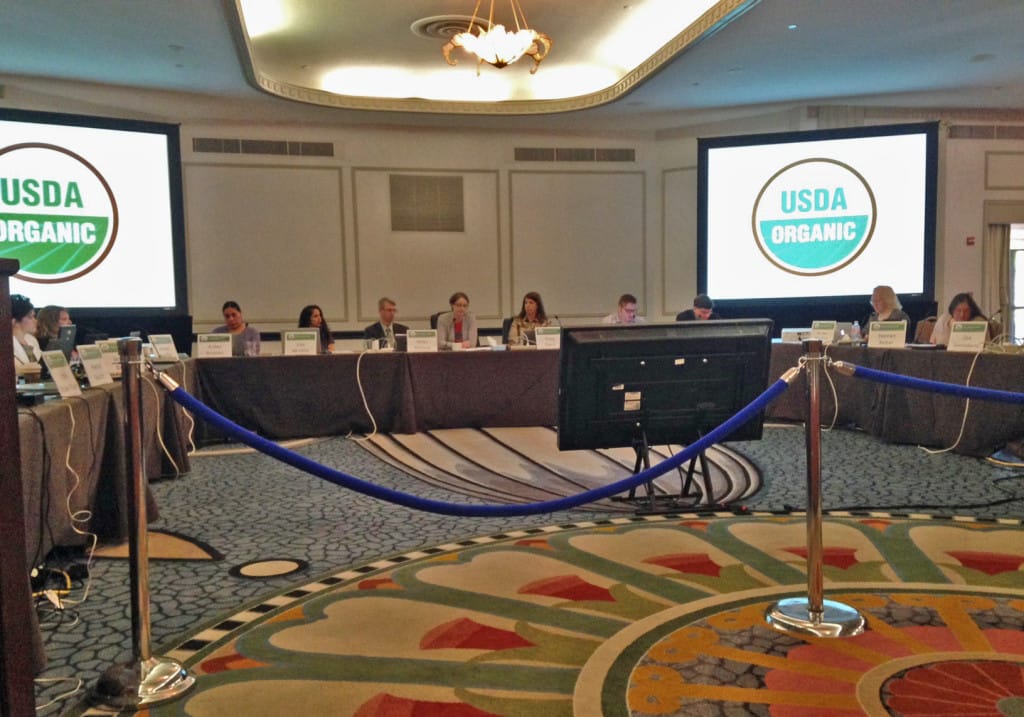
8:30 a.m. ET: NOSB spring meeting begins.

